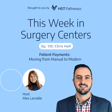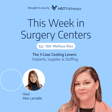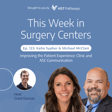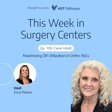Introduction & Episode Structure
00:00:01
Speaker
Welcome to This Week in Surgery Centers. If you're in the ASC industry, then you're in the right place. Every week, we'll start the episode off by sharing an interesting conversation we had with our featured guests, and then we'll close the episode by recapping the latest news impacting surgery centers. We're excited to share with you what we have, so let's get started and see what the industry's been up to.
Preparing a New Surgery Center: 30 Days Out
00:00:28
Speaker
Hi, everyone. Here's what you can expect on today's episode. We are in the home stretch of our nine part de novo series.
00:00:37
Speaker
And James McClung joins us this week for part eight to walk us through what you should be doing when you are 30 days from your first patient. So it's critical that you are crossing all your T's and dotting all your I's. So we'll go through your final regulatory and compliance checks, necessary equipment, tech supplies, contingency plans, preparing your clinical and administrative teams, and so much more.
James McClung's Expertise in ASC Industry
00:01:03
Speaker
And in our news recap, we'll cover the results from ASCA's Price Transparency Survey, provide an update on the No Surprises Act, share how ASCs are adapting for success, and of course, end the new segment with a positive story about a nurse who reunited with a man whose life she saved. Hope everyone enjoys the episode and here's what's going on this week in Surgery Centers.
00:01:32
Speaker
Hi James, welcome back to the podcast. Hi, thank you. In case our listeners missed your episode with us last year, can you share a little bit about yourself?
00:01:45
Speaker
Yeah, my name is Janice McClung. I'm a registered nurse, bachelor's registered nurse. I have been a administrator and pretty much filled any role in an ASC. I have a business that helps to develop and consult for ASCs. I'm on the executive board of the state organization for ASCs of Texas. And I'm also on the Triple HC Expert Content Committee, Dean status.
Final Regulatory Checks Before Opening
00:02:10
Speaker
So a little bit of experience.
00:02:12
Speaker
Amazing. And all of that experience is exactly why we needed to have you on today. For the last two months, we've been pushing out episodes focused mostly around the process of opening up a new surgery center and really trying to walk everyone through step by step of how to successfully open up a facility. So with you today, we're going to dive into what to do when you're 30 days out and make sure that you're crossing all your T's and dotting all of
Common Pitfalls in Opening New Centers
00:02:39
Speaker
So the discussion today will be bucketed by all the major areas. So let's start with compliance. What final regulatory and compliance checks should be conducted to guarantee everything's in order for your opening day? That's a good question. I did forget to mention that I am currently the nurse administrator of Memorial Ambulatory Surgery Center.
00:03:04
Speaker
And the reason why I say that is because we were just inspected by Triple HC. So I might bring it up as an example and I don't want to confuse anybody. I would say is that number one, when you're opening up a center, you need to have your closeout documents from your general contractor, warranties, preventive maintenance, preventive maintenance schedules, more importantly, how to use the systems, your processes and procedures that are going to go along with that equipment in those systems. With Triple HC, it's about
00:03:34
Speaker
do you do what you say you do, right? So they're very important. You also want to make sure to have in place guidelines, right? Guidelines are huge when it comes down to the specific temperatures or the specific ways that you run your sterilizer, right? Specific examples of how you wash your hands and how long you wash your hands, right? The metrics that you're looking for.
00:04:04
Speaker
So those need to be in place before you open up, if all possible. And I will say that is a good example of why using someone that has experience and help really leads to quality insurance, which is the biggest problem that I see in centers, especially independent, mostly independence, but it's done a little bit differently everywhere.
Infrastructure Challenges in Surgery Centers
00:04:27
Speaker
Yeah, we've talked a lot about at what point you get help and who do you get help from. And cause I feel like everyone opens, tries to open up a surgery center with the best of intentions, but if it's a group of physicians that are together and they've never done it before, then it's really hard to know all the little stuff that needs to be done and things can get delayed. Well, what's harder is who to trust. For example, I've been in several different turnarounds where the physician group
00:04:57
Speaker
trusted individuals, which they delivered, but there was certain discrepancies between the work the general contractor did and the approved plans of the architectural review unit of the state. And usually, typically, that's because of cutting corners and the almighty dollar.
00:05:19
Speaker
When I come in from the physical aspect, usually these are scenarios that I see where the physician group is having to replace a boiler after three years, which if taken care of can last forever,
Essential Regulatory Documents & Approvals
00:05:33
Speaker
right? Or HVAC issues where there's dampers missing or documentation missing or warranties. And there could be a liability issues that arise from that.
00:05:46
Speaker
Yep. That's actually the perfect segue. Are there other, any other examples or aspects of the kind of physical setup and infrastructure that should be reviewed? Yes, absolutely. Yeah. So all that I just said, and there are some specifics. I included the Texas department of state health, their architectural review unit has a checklist of closeout documents.
00:06:11
Speaker
includes a fire marshal approval, you're building inspection department approval, which means 100% inspection, which means that you are receiving your CO, which leads to that 30 days that everybody talks about. Once you have your CO, then you have 30 days where you can move in, and you really want to open up 30 days after that. Start those 10 cases and get Medicare involved. Our Triple HC, I would highly suggest
00:06:38
Speaker
especially on initial surveys.
Biomedical Checks & Equipment Functionality
00:06:41
Speaker
Deam status is the way to go for a new center that is not established yet. Now for existing standards or our expansions, the process is a little bit different and sometimes a little bit smoother because you already have those processes in place. But to answer the question is that you want to double check the ARU, right? It really starts with a punch list, right?
00:07:03
Speaker
because you're going through and making sure that fire caulking is done. The work that the general contractor did, it matches the ARU, right? I don't think usually official language is used like that, but that's what you really are doing is making sure that I've been in centers where it called for the recessed sprinkler systems, but the general contractors
00:07:25
Speaker
came in and put the non-recess sprinkler systems in there. So it does require someone to, in my mind, be there throughout the process, but that is your last chance. So making sure the generator runs under 10 seconds, that kind of stuff. Sure. Sure. Yeah. And how else can you verify that all necessary equipment and technology are fully functional?
00:07:51
Speaker
Well, number one, you have to have biomedical come check them for electrical safety, right? These are contracts that you need to have in place before you open and then also in services. The manufacturers, right? It depends if you get the equipment from a third party, make sure that it's a certified third party or a reputable third party, right? There's a lot of physician groups that I've seen
00:08:18
Speaker
that have been upsold, ask questions that are important to ask. The person that is selling it to you, are they upcharging that equipment? Is that the most necessary equipment for you? Do you need that piece of equipment?
00:08:36
Speaker
So it starts there. But once you have the equipment, that person that you bought it from needs to make sure, and you need to hold them accountable to have it in service, the instructions for use, right? And then also the other systems that are feeding that piece of equipment, making sure that they are working appropriately as well. And what I mean by that is, for example, the sterilizer, the boiler, if your water softener is not providing one part per
00:09:07
Speaker
whatever the annotation is that the editor is like milliliter, one part per milliliter, I think of hardness and it's higher. If it's hard water, your boiler will go out. So you need to make sure that you're following the instructions for use and that you have the appropriate PM schedules.
Preparing Clinical & Administrative Teams
00:09:25
Speaker
Those are set up that you have a schedule, a agreement for that. And then also that they in service you on how to use it appropriately. Gotcha. Yeah. All that makes sense. Switching gears a little bit.
00:09:37
Speaker
What strategies could ensure that the clinical and administrative teams are trained and prepared for that first patient to come in? Well, one starts with a plan, right? When you are a new center and you have not opened up a center before, those processes are not in place. And that needs to start very early in the development process in my mind. In fact, I have another tool that I created for the last task conference it has.
00:10:07
Speaker
a timeline of the individual steps it takes to develop a surgery center. It might have actually been included in our last podcast, I'm not sure, but it gives you a good indication of how long those steps should take. And that is a very important one, right? Because typically, if you're a practice and you are trying to transfer patients from one center to the next, there needs to be some type of incentive for those patients to
00:10:35
Speaker
to move typically because you don't want their experience to be effective, right? So having those conversations, setting up those processes, discerning how you're going to pay your contracts, right? Are they in place yet? Are you just going to offer cash pay to get those 10 cases that requires to get the AAACDM status survey? It's an imperative process that needs to be figured out before you get to that 30 days.
00:11:00
Speaker
Yes, absolutely. And so with those teams, do you recommend that the like surgery center leaders or physician owners really work with those teams or do you rely on your state AAC associations, just various training tools, any recommendations there?
00:11:25
Speaker
Yeah. Well, one, when it comes down to education, just make sure that you are the accrediting body that you're using, that you check their regulations on what education is required, right? Also, there are tools from experience that I have gained or created. Reach out to your neighbors. Don't just, do not reinvent the wheel. There are so many people out there that are willing to help. There are ASCA, there's TASQ in Texas, there's
00:11:55
Speaker
in California, every state that I know of has a state organization. Not to mention, at least on my
The Role of Pharmacy Consultants in ASCs
00:12:02
Speaker
middle level, that there's always, we need to stick together, right? And help each other out to survive. Nothing that we do is a secret. And the only way that it will get better is by us sticking together. So there's so many resources out there.
00:12:25
Speaker
you know, I'm pretty much, I would have to say is that I learned how to run an ASC from T, specifically more John, Bob, Tom, the toms, right? Chris, and then resources, right? Joe Zaza wrote a book on how to open up and develop a surgery center. I got that marked up, right? Ask His Finance book.
00:12:52
Speaker
Aska's forums and Googling that and being involved in it and actually replying. So every one of those people, thank you. Because I wouldn't be here without you. No, that's great to hear. Yeah, I love, the Aska forum is huge. I get the daily digest and all the questions you can learn so much and people share so much, spreadsheets, PDFs, handbooks, like everyone is always quick to respond and help out.
00:13:21
Speaker
Yeah, just go. Don't even, don't get me wrong. You should pay it forward and be involved, but their library is outstanding. Yep. I agree. All right. So let's talk about supplies, meds, and other necessary resources. What should you be doing just to confirm that you're all set in that regard? All right. So James McClung's pet peeve of 2020.
00:13:48
Speaker
been a pet peeve of mine forever. Well, you don't increase the responsibilities of ASCs by trying to just add as much stuff as you possibly can and just doing everything that other facilities potentially would do. We need to maximize our efficiency within what we do have now, the responsibilities that we're able to accomplish now. And one of those that I feel like we are not doing enough in is pharmacy.
00:14:17
Speaker
I feel like our pharmacy
Contingency Plans & Continuity of Care
00:14:19
Speaker
consultants that we contract with are being sorely underutilized. And I will tell you that my first center that I developed, I'm very fortunate to be introduced to a pharmacist that was looking to go out on her own. So from the very beginning, we learned together.
00:14:41
Speaker
And I assure you, she's the only pharmacist that I know, trust with narcotics, but I know that she's doing it right. She's involved in quality improvement. She orders narcotics. She looks for lookalikes, soundalike drugs. She helps in education and with the crash cart, organizing the crash cart, medication utilization, and also with anesthesia, making sure that they're labeling, making sure that they're following
00:15:10
Speaker
proper etiquette and industry standard when it comes to patient care, right? She's just much more involved than just coming in and doing chart audits. And I feel that is something that needs to be addressed and improved across the board in our industry. Yeah. Is that Jones, Amy Jones by any chance? I can't think of her name, but we had a great pharmacist consultant. Exactly who it is, yeah.
00:15:45
Speaker
That's awesome. Good. And my mind is probably the only one you need to know at this point. That's great. Sorry, continue. I just was like, it had to be her.
00:15:55
Speaker
No, but within that though, look to the experts. Get your fire marshal, well not fire marshal, but like your fire alarm company to come in and show you how to do it. Set up with them to do a fire drill once a quarter, right? Learn how the fire alarm contacts the fire company, how the EMS is contacted. Contact EMS. Have them there for recode. Learn how long it's going to take for them to get there. Know your neighbors. It's not what you know, it's who you know.
00:16:25
Speaker
You have two relationships when it comes down to running an appropriate center, living in the now. A big thing for me is the timeline when it comes down to compliance. You live in the now, right? That's your goal, right? And then you would look into the future and then the past is last, right? So if you're stuck in the past, you're just treading your feet on a hamster wheel and you're not living in the now.
00:16:53
Speaker
And the weight of compliance could literally crush you. The way you do that is by making relationships, staying involved, getting involved,
Final Advice for New Surgery Centers
00:17:02
Speaker
and not only looking to learn how to do it, but to make it better for the ones that follow you.
00:17:10
Speaker
Yeah, that's great. I feel like we're, this is very like philosophical today. We're going deep. It's because I'm at a center. It's no like, when I'm at a center, I'm more like Phil Jackson. I'm serious. Like I had the lights turned low and I'm like, everybody breathe, dude.
00:17:29
Speaker
I love it. It's about more of the why than right into what. Yeah. For sure. What advice do you have for developing contingency plans to address any and all unforeseen challenges? Yeah. And so beyond quality assurance where my biggest goal of 2023, and one of the reasons why independence probably should unite.
00:17:55
Speaker
is quality assurance. There's been many centers that I have helped to develop where it's like a mix and match of different manufacturers on the water softener or another process, the air compressor, right? And the reason being is because general contractors don't know the difference, right? They don't know why we would want to have just a stairs, right? Or a coligan water softener. And so they're looking to
00:18:25
Speaker
save money, right? So therefore it's a little bit different and those small differences add up, especially when you don't have someone that doesn't understand that concept. But the other concept that is big to me is continuity of care. And when I come into centers, a lot of times there's probably a lot of leadership turnover, but more importantly, or I wouldn't say sadly, but concerning is that
00:18:55
Speaker
There is no continuity of care. There's usually one person or a few people that take on the weight of the world. And then if they leave, or if they don't leave, no one else is involved. And so there's a big, giant disconnect of how it was done before, how it's being done now, and then how it's going to be done in the future.
00:19:19
Speaker
there's no continuity of care, right? And so how you do that is by involving others, right? Performance evaluations, right? Looking at how others have done it, not reinventing the wheel, including Triple HC, including your department of state health. Stop living in fear, live in the now, right? It's not about where we're at today, right? It's about where we'll be at tomorrow.
00:19:46
Speaker
right? And there will always be someone that may have to fill that role, even if you're promoted or win the lottery, right? So it's all about patient care and keeping that constant quality when it comes down to patient care. Great.
00:20:04
Speaker
And I feel like you've shared a lot of advice with us so far, but any final last words of wisdom or inspiration for those who are nearing their opening date might be slightly panicking, but are excited to open. Any final words of wisdom? Yeah. You're not alone, right? The more that you can do up front, the better. Loading contracts into your EMRs, loading the preference cards into your EMRs.
00:20:32
Speaker
If you are finding yourself saying, we'll do that later, reevaluate that. It's not alone. There are other people that can help you to accomplish those goals. But once you get going and you hit the ground running, it's much harder to go back into the past. Yep. Definitely. Cool. Thank you so much, James.
News: ASCA Survey on Price Transparency
00:20:54
Speaker
So we do this every week with our guests. What is one thing our listeners can do this week to improve their surgery centers?
00:21:02
Speaker
No, yeah, we've talked about it, but quality assurance and continuity of care. Cool. Perfect. All right, James, thanks so much for coming on again. We appreciate it. Anytime. Thank you for having me. As always, it has been a busy week in healthcare, so let's jump right in. ASCA released the results from their August 62nd survey, which asks questions all around price transparency.
00:21:32
Speaker
So as a reminder, very, very quick history lesson here, the push for healthcare price transparency gained traction with the Affordable Care Act, but things really started moving in 2019 when hospitals had to publicly share their standard charges online. And then in 2021, a new rule was introduced demanding hospitals be more transparent, followed by similar requirements for health insurers the next year.
00:22:00
Speaker
And then on the ASC side, as we know, surgery centers must provide a good faith estimate to uninsured or self-paying patients under the No Surprises Act. And then just this past September, a bill titled Lower Costs More Transparency Act was introduced suggesting ASCs should disclose their standard charges. Though it didn't pass, it does, of course, indicate this growing interest in price transparency as a whole. So the timing of this survey is perfect.
00:22:28
Speaker
All right, so what did the survey results entail? So ASCA had 160 respondents across 39 states, and they shared that 70% of their websites have a list of common procedures, but only 20% shared that their website includes price information for those common procedures.
00:22:48
Speaker
So those numbers are lower than I would have liked to see, but the positive is that regardless of what is shared on their websites, 91% of respondents said their facility has a standard workflow for providing estimates to patients at least prior to their procedure. And lastly, 77% are using the payer negotiated rate to calculate those price estimates, while 12% are using cash prices and 7% are using procedure gross charges.
00:23:18
Speaker
Now, ownership does play a role here, which I think is really interesting. Those who have hospital ownership are more likely to have a website, but less likely to provide estimates. And then those who have physician ownership are less likely to have a website at all, but more likely to have a standard price estimate workflow. So they're kind of flip-flopped there.
00:23:43
Speaker
Now, Alex, Tyra, and Aska did a great job summarizing additional results from the survey. So as always, we'll link to the article in the episode notes if you want to kind of dive into these numbers further.
Proposed Fee Hikes in No Surprises Act
00:23:56
Speaker
And then sticking with our transparency theme, in a proposed rule filed about two weeks ago,
00:24:03
Speaker
The HHS, the Department of Labor and the Department of the Treasury proposed hiking the administrative fee to enter the No Surprises Act independent resolution process from $50 to $150. The agencies also proposed increasing the upper limit of the fee range for certified IDR entry entities by 20% for single determinations and 25% for batch determinations.
00:24:32
Speaker
and the proposed rule of finalize would go into effect on January 1, 2024.
00:24:38
Speaker
So the agencies project to spend $70 million to implement the independent dispute resolution process in 2024 on personnel costs, certifying IDR entities, and completing investigations. So assuming 225,000 IDR disputes closed next year based on trends observed previously, the proposed increase would allow these agencies to recoup the costs.
Strategies for Success in Outpatient Care
00:25:06
Speaker
But as a reminder,
00:25:07
Speaker
Another little history lesson. The federal IDR portal was opened between April 15th, 2022 to March 31st, 2023. And during that time, 334,828 disputes were filed, which was nearly 14 times the number of claims CMS had estimated and prepared for. Hence why they're anticipating that they need all this additional funding to manage the process correctly.
00:25:36
Speaker
Jim Budzinski, who's the CFO of WellStar Health System, shared that he had filed approximately 8,000 IDR requests since the portal opened. And of those, only 7% have been resolved. So though, again, the belief is that raising the fees could provide agencies with additional resources to address the large dispute volumes.
00:25:59
Speaker
Now, the kicker is we can't raise the fees too much where it becomes prohibitive for the average person to be able to submit something through the IDR process. So that's where we have to find the balance here. So we will keep watching this bill and see where it goes, but just your usual reminder to get ahead of all things related to price transparency, get those automated workflows in place, and get ahead of the legislation that has come your way and will just continue to come your way.
00:26:30
Speaker
All right, switching gears a bit, Becker's ASC asked a few surgery center leaders the following question. How have you updated your strategy for success in outpatient care recently? So I'm just going to summarize a few responses here, but as always, I recommend checking out the full article because there are so many good tips, but here are a few that stood out to me that I wanted to share in no particular order.
00:26:57
Speaker
So the Spine Center Atlanta has embraced technological advances to streamline communication and stay connected with patients after the patients leave the ASC. They have also increased their digital presence to stay connected to patients through email and social media.
00:27:16
Speaker
Austin Orthopedic Institute focused on critical metrics such as patient outcomes, patient satisfaction, efficiency, and cost. And post-operatively, they also have been bringing in a licensed physical therapist to help mobilize patients before they even leave the facility. Spine and Orthopedic Center in Florida is leaning into new technologies and techniques that are allowing for more opportunities for minimally invasive spine procedures.
00:27:46
Speaker
They are also focusing on patient education, recognizing that well-informed patients generally experience better outcomes. And lastly, Brentwood Surgery Center is completely focused on total joints, sharing that ASCs that have not adopted or are planning to adopt this strategy are behind the curve and missing out on the great migration.
Heartwarming CPR Story at Football Game
00:28:09
Speaker
So just a few highlights there, but great insight into how some of the leading surgery centers are planning for the future.
00:28:17
Speaker
And to end our new segment on a positive note, nurse Lauren Hyvert was at the Notre Dame versus Nevada football game when she noticed a man who appeared to have dozed off. So she had asked if he was okay. And then shortly after she heard someone say, I can't wake dad up, which is terrifying. So she ran over to the scene and as a cardiac nurse, she performed CPR until the first responders arrived and they were able to safely get him to the hospital.
00:28:47
Speaker
And today, Mike Brown is alive and well, and he was recently reunited with Nurse Hiver at a Notre Dame football game again. And that news story officially wraps up this week's podcast. Thank you, as always, for spending a few minutes of your week with us. Make sure to subscribe or leave a review on whichever platform you're listening from. I hope you have a great day and we will see you again next week.




















